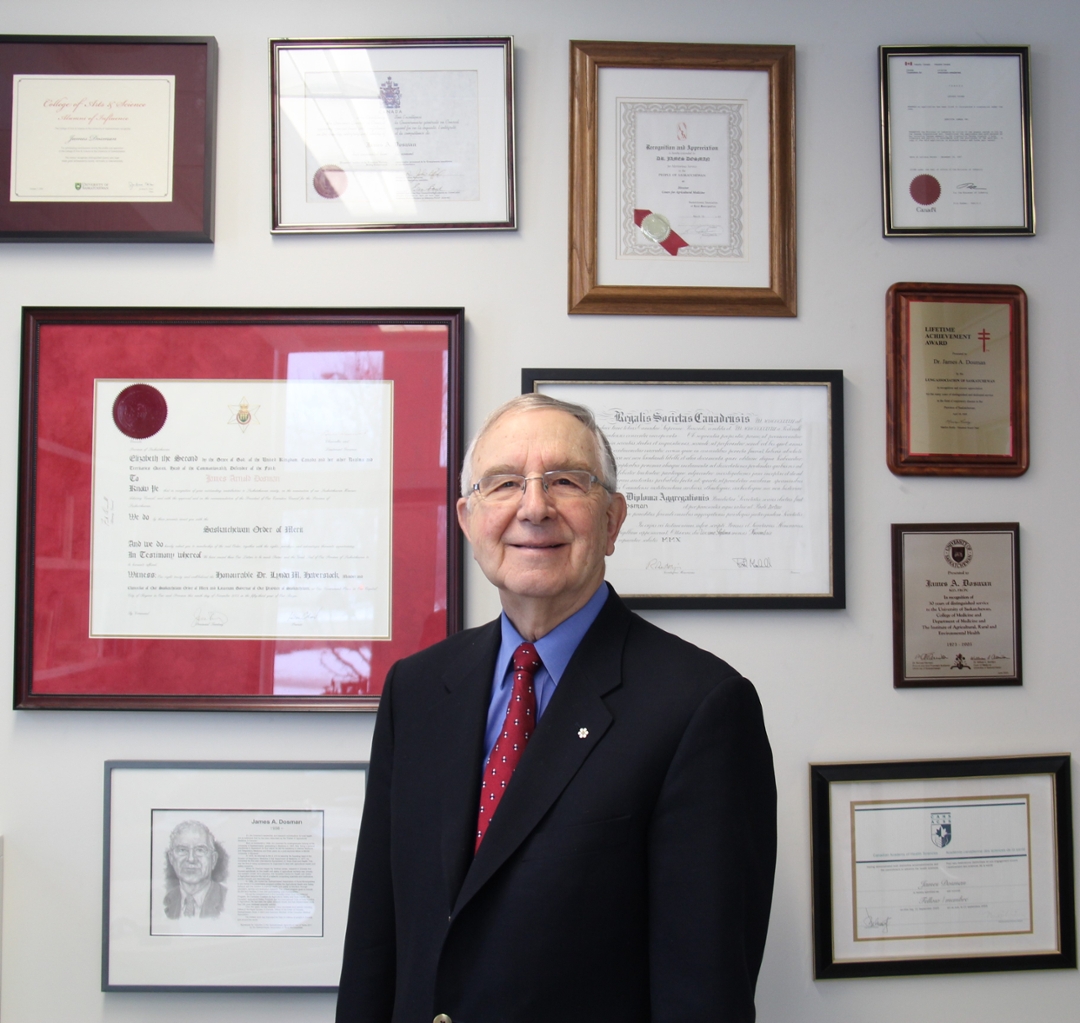
Medical hall calls on Dr. Dosman
Though he’s known as the “father of agricultural medicine,” Dr. James Dosman (MD) didn’t have rural health care in mind when he started his career in medicine.
By Kristen McEwenThe distinguished College of Medicine researcher at the University of Saskatchewan (USask) will be inducted into the Canadian Medical Hall of Fame (CMHF) on May 2 for his contributions to respiratory, agricultural and rural medicine.
Initially, Dosman wanted to specialize in cardiology while attending the cardio-respiratory medicine program at McGill University in Montreal in 1969. He landed his specialty after a good friend and respiratory research fellow encouraged him to make the switch.
“I thought that going into respiratory might present certain opportunities,” Dosman said.
After finishing his studies and research in Montreal, he had a choice of where his career would take him next—from Johns Hopkins Hospital in Baltimore, to Edmonton or Winnipeg.
But in 1975, he decided to come back to the University of Saskatchewan, where he started the path of medicine. More than 40 years later, he is still leading innovative research initiatives on campus, serving as a Distinguished Research Chair.
“I think (my wife) Sue would say one of my (traits) is loyalty,” Dosman said. “My parents lived here … We certainly had roots.”
From Annaheim to Saskatoon
Dosman grew up on a farm in Annaheim, Sask., located 35 kilometres northeast of Humboldt.
In his final year of high school, a teacher encouraged Dosman to pursue medicine.
“He said, ‘Those doctors are no smarter than anybody else. They just work harder.’ I thought that fit me perfectly,” Dosman said.
He attended USask in 1959 to start studying medicine. Shortly after, he met his wife, Susan. They will be celebrating their 57th wedding anniversary in 2019. The pair have five grown children; four girls and one boy.
“Sue’s been very much a part of it all—ups-and-downs, and schemes and planning, triumphs and failures that go along with almost doing anything,” Dosman said.
The effects of grain dust
Dosman returned to Saskatchewan in 1975 after receiving an offer to lead a new partnership between the USask College of Medicine and the Saskatchewan Anti-Tuberculosis League, later known as the Lung Association of Saskatchewan.
Dosman’s first project with the league was the Grain Dust Study. His team studied breathing tests from 1,100 elevator agents, at the request of the Saskatchewan Wheat Pool, to determine the effect of grain dust on lungs. The team found the test results showed the grain dust was affecting the lungs of the participants. This discovery led to an international symposium, Grain Dust and the Lung, in 1977, as well as the publication of a book on the findings.
The national department of labour asked Dosman to lead a committee, resulting in the national Canadian Grain Dust Medical Surveillance program. The program mandated that companies had to reduce dust levels and offer a breathing test every three years.
“At 38 years old, I thought this is just what happens, I didn’t realize that to translate research into policy and program in such a short period of time was an unusual opportunity,” Dosman said.
Dosman collaborated on many studies that would lead to provincial, national and international impact, including developing an international code of safe practice in agriculture for the United Nations International Labour Office.
Legacy at CCHSA
Dosman is currently working within the Canadian Centre for Health and Safety in Agriculture (CCHSA), formerly known as the Centre for Agricultural Medicine, which he helped establish in 1986. The faculty, students and staff in the centre focus their research on various issues around health and safety in agriculture and rural life.
Recently, Dosman became a certified specialist in sleep medicine. His team has been working with First Nations communities for the past two years and studying the effects of housing and social conditions on sleep and breathing problems.
CMHF nomination
Dosman was nominated as a 2018 CMHF inductee by CCHSA director Dr. Niels Koehncke (MD).
“It’s very moving to be recognized,” Dosman said. “You don’t do it for that reason. In the early years, we said we did it because we didn’t know we couldn’t do it.”
One key message that Dosman sticks to is “knowledge is universal.”
“Research is important. It affects health in the end—one way or another,” he said. “Whether it’s one grain of knowledge that fits into a larger piece, much of our research is practical in nature.”
